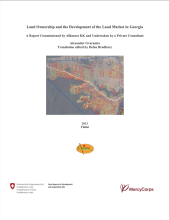Land Library Search
Through our robust search engine, you can search for any item of the over 73,000 highly curated resources in the Land Library.
If you would like to find an overview of what is possible, feel free to peruse the Search Guide.
/ library resources
Showing items 1 through 9 of 14.As per the provisions of rule 10 of the rules of procedures of the United Nations Convention to Combat Desertification (UNCCD) Conference of the Parties (COP), the second intersessional meeting of the Bureau of the thirteenth session of the COP (COP 13) held in Guiyang, China, on 26 February 2019
Land acquisitions, either driven by foreign investments or domestic investment needs have continued to polarize opinions.
The objectives of this study were to evaluate the environmental and economic impacts of year-round-grazing systems and a conventional housing system for Japanese Brown fattening steers by the life cycle assessment (LCA) method.
The Land Act, 2012
The Land Registration Act, 2012
The National Land Commission Act, 2012
The Environment & Land Court Act, 2011
The Urban Areas & Cities Act, 2011
The first set of the land laws were enacted in 2012 in line with the timelines outlined in the Constitution of Kenya 2010.
This report was produced by a private consultant Alexander Gvaramia a legal expert on land laws and issues and a member of the Swiss Development Cooperation funded Mercy Corps Georgia implemented Alliances Kvemo Kartli Programme, Helen Bradbury, a market development programme working in the dairy
The spatial distribution of vegetation trends identified by time series analysis of the normalized difference vegetation index (NDVI) for the Mongolian grasslands was cross-referenced with the recently obtained land use/cover data and socioeconomic information in the geographic domain.
Fiscal instruments are tools that governments use to manage revenue and expenditure and therefore influence the growth (or stability) of the various sectors of the economy. Government revenue is derived primarily through taxation.







